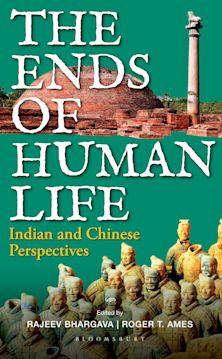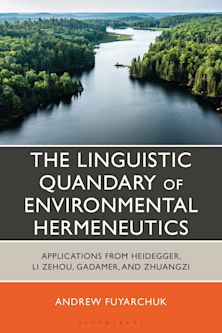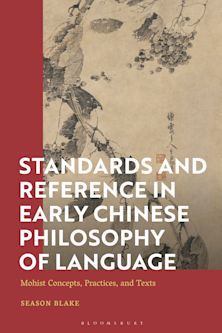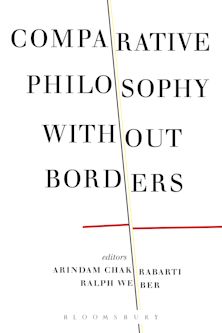Embodiment Theory and Chinese Philosophy
Contextualization and Decontextualization of Thought
Embodiment Theory and Chinese Philosophy
Contextualization and Decontextualization of Thought
Description
This book analyses some of the seminal texts of the Chinese tradition in light of the embodied tradition: the Analects of Confucius, the Zhuangzi, and the Treatise on Music. Margus Ott's study shows how they exemplify aspects of embodiment theory while highlighting others that have been neglected in contemporary work. Ott also develops far-reaching possibilities of an embodied philosophy.
The embodied understanding did not go unchallenged in Ancient China. There were important counter-currents, most notably the Mohists and the so-called Legalists. It has been argued that this challenge set the Chinese philosophical tradition in motion. By using embodiment theory Ott demonstrates how these ideas can be seen as a decontextualizing tendency of thought that plays an important role in human affairs.
Table of Contents
1. Introduction
1.1. Contextualizing and Decontextualizing Thought
1.2. Roots of Embodiment Theory (ET)
1.3. Chinese Traditions and ET
1.4. Content Summary
2. Embodiment
2.1. Tenets of Disembodiment
2.2. Embodiment
2.3. Embeddedness
2.4. Enactment
2.5. Extendedness
2.6. Affectivity
2.7. Emergence
2.8. Self-relation
2.9. Other-relation
2.10. Implicitness
2.11. Guidance by Example
2.12. Singularities and Intensities
2.13. Embodied Disembodiment
2.14. Meaning of Disembodiment
2.15. Conclusion
3. Background
3.1.Greek Socio-political Background
3.2.Chinese Socio-political Background
3.3. Ritual Background
3.4. Rituals as Contextualizing
3.5. Kurankos
3.6. Hasidic Traditions
3.7. Ritual Knowledge
3.8. Conclusion
4. Embodied Foundations: Confucius ??
4.1. Embodied
4.2. Singular and Ordinary
4.3. Embedded
4.4. Flexibility
4.5. Enacted
4.6. Extended
4.7. Other-relation
4.8. Emotive
4.9. Implicitness
4.10. Emergence
4.11. Ease and Joy
4.12. Self-cultivation
4.13. Conclusion
5. Mohist Disembodied Reaction: Mozi
5.1. Introduction
5.2. Disembodied Standards
5.3. Extension of Subjectivity: All-inclusive Care
5.4. Meritocracy
5.5. Explicitness
5.6. Conclusion
6. Legalist Disembodied Reaction: Han Feizi
6.1. Introduction
6.2. Laws
6.3. General and Explicit
6.4. Generality of Basic Preferences: Third-person View
6.5. Staying “cool”
6.6.New, Decontextualized Civic Morality
6.7. Objectivity, Quantity
6.8. Conclusion
7. A Confucian Development of Embodiment: Record of Music (Yueji)
7.1. Mencius
7.2. Xunzi
7.3. Record of Music
7.4. Emotions
7.5. Return to One's Body: Individual Transformation of Emotions
7.6.Social Embeddedness: Collective Transformation of Emotions
7.7.Ontology of Energy and Veins
7.8.Self-cultivation According to Energy and Veins
7.9.Enacted Knowledge
7.10. Music and Rituals: integration and differentiation
7.11. Free Space
7.12. Simplicity and Ease
7.13. Cosmic Purport
7.14. Conclusion
8. A Daoist Development of Embodiment: Zhuangzi
8.1. Introduction
8.2. A “knack”
8.3. Stages of Practice
8.4. Danger of Mechanical Mind in Extended Cognition
8.5. Other-relation
8.6. Transformation
8.7. Sitting and Forgetting
8.8. Free Roaming
8.9. Knowing with Non-knowing
8.10. Zhuangzian Ideas as Reflection on a Skill
8.11. Zhuangzi and Decontextualization
8.12. Conclusion
9. Conclusion
Notes
References
Index
Product details

| Published | 25 Jul 2024 |
|---|---|
| Format | Ebook (Epub & Mobi) |
| Edition | 1st |
| Extent | 232 |
| ISBN | 9781350424166 |
| Imprint | Bloomsbury Academic |
| Illustrations | 10 bw illus |
| Publisher | Bloomsbury Publishing |
Reviews

ONLINE RESOURCES
Bloomsbury Collections
This book is available on Bloomsbury Collections where your library has access.


































